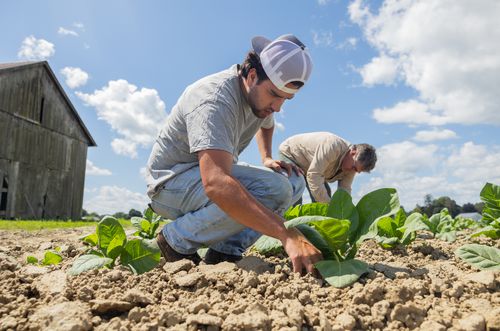
August 13, 2023
Tobacco farms have dwindled but hang on in the Valley; summer floods sent them back to square one
BY MassLive
HATFIELD — Tobacco prefers dry days. “Tobacco is finicky and susceptible to the weather,” Mark Wendolowski said.
Mark and Alicia Wendolowski, owners and operators of Wendolowski Farm in Hatfield, are usually able to fill 14 tobacco barns that sit on five plots. But with this summer’s frequent rain, and flooding, they have lost about 70% of their yield.
The Wendolowskis are not alone.
The state Department of Agricultural Resources estimates at least 75 farms of all types have been hurt by flooding that affected more than 2,000 acres of crops, resulting in at least $15 million in damages.
Most of the affected farms have been in Hampshire and Franklin counties. Statewide, tobacco makes up only 0.2% of all farms, according to Claudia Quintero, staff attorney at the Central West Justice Center.
Alex Malinowski, of Malinowski Farms in North Hatfield, said all of his tobacco crops rotted out this year.
Normally, Malinowski Farms harvests from about 45 acres. This season, the yield will come from less than seven acres, the lowest in recent memory.
Flooding prevents farmers from tilling, a practice that that helps water soak in. When water sits in the fields, crops develop diseases. The wetter the weather, the more mold and mildew breed, Mark Wendolowski said. In standing water, diseases like blue mold breed and can become airborne in tobacco fields.
“Blue mold is present in the air when conditions are damp and rainy. The longer the water sits, the more disease has a breeding ground to form and then eat away at the root of the plant,” Malinowski said.
With the recent success of the cannabis industry, Malinowski expects interest to grow in tobacco farming.
Malinowski, a member of his family’s fifth generation in tobacco, hopes the industry can grow back into the economic driver it used to be. But with this year’s wet season, they are back at square one.
Tobacco was once one of the largest economic drivers in the Valley, from Greenfield to Portland, Connecticut. Not a lot of farmers in the Pioneer Valley are still growing tobacco, Malinowski said.
A 2017, USDA Farm Census report found fewer than 15 tobacco farms in the area, including five or so in Hampden County, Quintero said.
Mark Wendolowski’s family immigrated from Poland and has been tobacco farming in Hatfield since the early 1920s. When his father died in 2021, Mark took over the farm.
“Acreage-wise, tobacco is small crop compared to what it used to be. There used to be about 5,000 acres in the Connecticut River Valley. Hatfield alone had about 3,500 acres of tobacco and now there is … just under 300 acres,” Wendolowski said.
The reason for the decline? Competition from Ecuadorian farms and federal anti-smoking efforts of the 1980s.
Tobacco has seen a revival since 2011-2012 — and the trend has been increasing Wendolowski said.
Both the Wendolowskis and Malinowskis grow broadleaf tobacco for high-end cigar wraps.
The Wendolowskis export their tobacco internationally to reach high demand in Asia. Up to four cigar wrappers can be fashioned out of each leaf; a plant typically has 10 leaves.
The Malinowski farm distributes locally to Dunn and Foster in Connecticut.
The Wendolowskis start seeding in a greenhouse in mid-March. The year looked promising until the rain hit.
With too much rain, the quality of leaves suffers. To make the cigars, each leaf is cut on the veins to make squares before they are stuffed and rolled.
“If there are holes and tears in the leaves, or if the leaf is ripped, it cannot be sold,” Wendolowski said.
On top of farms losing most of the season’s harvest, smaller yields also mean fewer hours for farm hands.
In Hampshire and Franklin counties, the heavy rain displaced more than 2,500 seasonal farmworkers who rely on the summer for most of their yearly wages. Only a fraction of that is work in tobacco.
The Malinowski Farm uses four family members and does not hire many seasonal workers. During harvesting, the Wendolowski Farm typically hires up to 25 seasonal workers — a mix of high school students and a few migrant workers from Guatemala.
“We have been able to keep most seasonal employees besides the high school students. The state said they would help us, and our goal is to help them. Some kids have been with us for years and usually will stay for the full summer,” Alicia Wendolowski said.
Quintero estimates there are 150 to 200 tobacco workers in the state.
“I would say that there (is) a mixture of local and migrant workers, we know that about one-third of the farmworkers in Massachusetts are H-2A, migrant workers, and the rest (are) domestic local workers,” Quintero said in an email, referring to an agricultural visa program.
Displaced seasonal immigrant workers are not eligible for unemployment benefits. Also, exclusions in state law that allow the minimum wage for farmworkers to be 47% lower than the state minimum wage, according to the Fairness for Farmworkers Coalition.
As a result, farmworkers’ families live in severe poverty, at rates two times higher than the statewide average , said Quintero. Although farmers have been supported, there is not much the state does for farmworkers to help them in these situations.
“Though we have seen the state step up for farmers, even during COVID-19 many farmworkers were left out of the stimulus pay and the state did not provide specific support for these workers. It is imperative that we do not forget this very important and essential workforce when tragedy strikes,” Quintero wrote.
Proposed legislation known as the Fairness for Farmworkers Act would ensure a more equitable and sustainable agricultural industry, advocates say.
The act would include farmworkers under the protections of state minimum wage and overtime laws, in addition to creating a tax credit to help farmers pay employees more equitably for their work, the coalition said in a statement.
Because crops yields are low this year, the Wendolowskis have had seasonal workers help on another project: the rescue of tobacco barns.
“It has been a big effort to save the historical buildings that would otherwise be lost. It is important to us, and we don’t want to see the barns disappear,” Alicia Wendolowski said. “We rely on our employees, and they must be able to count on us to be reliable too,” she said.
